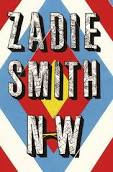
This is a hymn not so much to London as to one corner of London. In this way, it is a book deeply of that city, because no one actually lives in London; one lives in Clapham, or Peckham, or Dulwich. The horrible oppression of the tube keeps London separate and small.
NW tells the story of two women who grew up on a council estate together, and follows them through a few months in their mid thirties. It’s centrally concerned therefore with the issues of one’s thirties, and in particular the question of children. One of the women has already had children, and the other has told everyone she is ‘trying’ – in fact, she is secretly on birth control. Here is her perception of a group of mothers she is at a party with:
. . . women for whom trying is half the fun and ‘you’re next’ does not sound like the cry of a guard in a dark place
She herself is not sure why she is unwilling to procreate
Be objective! What is the fear? It is something to do with death and time and age. Simply: I am eighteen in my mind I am eighteen in my mind I am eighteen and if I do nothing if I stand still nothing will change I will be eighteen always. For always. Time will stop. I’ll never die. Very banal, this fear. Everybody has it these days.
I found this to be sort of profound. Not so much with regard to having children or not having children but just in terms of thinking about one’s life overall.
The novel is engaging and well-observed, but it does have some unfortunate ‘modern novel’ tendencies. I’m sorry to have to tell you that we do :
-randomly jump around from character to character
-have a character become deeply anxious about a minor event in a lame thematic way
-becomes horribly poetic for no reason:
Apple tree, apple tree.
Thing that has apples on it. Apple blossom.
So symbolic. Network of branches, roots.
-totally fail to resolve . This is partly a function of the fact that we jump around so much, but it also on a larger level a failure to handle the child theme. At the end, at a climactic moment, a woman embraces her child, and there is some nonsense about how holding her child makes it all worthwhile, it’s beyond words, etc. I mean: seriously? After all that intelligent discussion of the problem, that’s what you’ve got?
Having said that, it gave me much to think about. How’s this, about lending someone thirty pounds to visit their sick mother:
But already the grandeur of experience threatens to flatten into the conventional, into anecdote: only thirty pounds, only an ill mother, neither a murder nor a rape. Nothing survives its telling
Now I don’t know what she’s on about here. For me the anecdote is often better, richer, and truer than the actual lived experience, which is just a pale shadow of my story about it.
